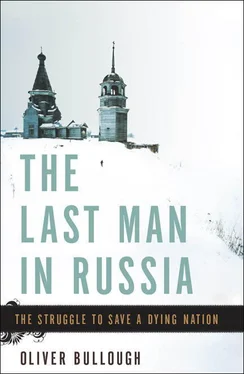Stalin’s lack of sympathy for the starving peasants, whom he referred to as ‘peasants’ in inverted commas as if to accuse them of being impostors, was shown when, in a private telegram, he said they were Polish agents seeking to blacken the Soviet Union’s name. Ukrainian officials followed his lead and said the peasants were starving because they were lazy. Some 21,000 top officials, meanwhile, had access to special shops in the cities where delicacies were still available. Closed Shop No. 1 served the Moscow elite.
While officials ate caviar, the boy Germangenovich was killing vermin to try to stop them eating the grain that was left.
‘We were ordered to kill mice, and we got given a book if we brought in a hundred mouse tails. It was a plague of mice,’ he said. ‘That is how we lived. Up to the war.’
On 22 June 1941, Nazi Germany attacked the Soviet Union, finding the Russian troops totally unprepared. The invaders’ advance was quick and devastating. By 17 August, they had seized Berezina. The same disregard for logic that had led the Bolsheviks to starve millions of peasants had also persuaded them to purge the highest ranks of the army, leaving the officers untrained and scared to take the initiative.
The Germans took whole armies of Soviet troops prisoner, of whom 2.8 million would be dead by early 1942. It was one of the most spectacular military disasters in history, and it exposed Father Dmitry and Germangenovich to the German army and an entirely different culture.
‘When the Germans came here in 1941, they looked at us and said ai-ai-ai. All these Russian children are naked. They were a badly fed army, and they asked my mother for eggs. And she said there were no eggs, because there was no grain for the chickens. They were soldiers just like ours,’ said Germangenovich.
He could speak a little German that he had learned at school, so he often spoke to the soldiers, he said. They had nothing good to say for Hitler, or for Stalin. Neither side wanted to fight. They said they wanted to grab Hitler and break him over their knees.
The Germans, he said, took their pig. Before the Germans came the whole village had been called out to dig anti-tank defences around Unecha. ‘We were digging anti-tank pits when suddenly there’s a motorcycle, and then the planes, and then tanks with the black crosses on them. It was hot, like today. A German tank driver comes out, with a red scarf. He saluted and said “Guten tag.”
‘Then the general came and told us not to be scared, that he had come to free us from the Bolsheviks. Our people were very glad really, despite what you read in the history books now. There would not be a collective farm again. They gave us our land, and reopened our churches. And this general said they would not shoot Unecha if no one shot at them.
‘The Germans gave us land, divided up the horses. We started to grow wheat. In 1942 and 1943 we had a great harvest, we kept it for ourselves, and the Germans took meat, chickens and pigs. They opened the churches, and people went to churches to pray. We chose our own mayors, police. The mayor was our neighbour. The Germans made us work sometimes, carrying wood or resurfacing the road, but it was not so bad.’
The Germans brought order, according to Germangenovich’s account, which more or less tallies with most academic studies I have read. He described how the Germans shot one of his neighbours for stealing a pig. And, he said, they killed the Jews – a fact he related deadpan, as if it did not bother him. That was in November 1941 and March 1942 when Sonderkommandos 7b and 7a rounded up the Jews in Klintsy, Oryol and Bryansk.
‘They killed the few Jews that we had here, and the gypsies. There was one young Jewish lad, but he left, so it was just the old ones left behind. All the Jews worked in the town, they traded, they didn’t work with their hands. There were maybe a hundred in the city – they were killed.’
In a sudden rush of memory, he flicked back to the start of the war: ‘The Germans had dropped all these leaflets on us. They published newspapers as well. They had agitators who worked hard. “Destroy the Yid politicians,” the leaflets said. They threw leaflets from planes, I remember.’
Later I decided to look up those leaflets in the Lenin Library in Moscow. I found a section – formerly classified – of ‘special materials’, newspapers published by the Germans under occupation, which people like Germangenovich would have read. Sure enough there was a photograph of children and adults running after airdropped leaflets tumbling through the air. Perhaps he was among them.
The newspapers were a glimpse into a vanished life of a non-Stalinist Russia in the 1940s. There were jokes (‘What is the punishment for bigamy? Two mothers-in-law’), lists of church services, and accounts of how the peasants were using their private land. Every issue had lists of people missing – wives, children, mothers – and the names of those looking for them.
‘Konstantin Mitenkov from the village of Kamenki… informs his wife that he is alive and healthy,’ said one notice.
Most of the pages, of course, were filled with orders and propaganda. All typewriters were confiscated and town-dwellers were banned from venturing into the countryside. Jews were blamed for everything, over and over, particularly for the repression dealt out by Stalin’s NKVD security service. A picture of an Orthodox priest featured the caption: ‘When the healthy body of the accused person survived the six weeks of torment, he had to appear before the tribunal of the NKVD, which included in its make-up only Jews.’
Anti-Jewish campaigns in Slovakia, France, Norway and elsewhere were described in horrible detail, as was a build-up of anti-Semitism in the United States. Russians were exhorted to unite with the Germans against this supposed mutual enemy. It was clear that not everyone swallowed the message. A decree promised death to anyone who sheltered Soviet partisans, and deprivation of rations to anyone who did not register themselves with the authorities.
But some Russians did go along with the Nazis. There were photographs of Russians in German uniform. ‘They know who is really to blame for the war,’ one paper said; ‘fighting alongside the German soldiers and their allies, they are aiming for one goal: to destroy Jewish Bolshevism and give peace to the Russian land.’
The Soviet troops returned to Unecha on 23 September 1943.
‘I went to church. I was in the choir during the occupation,’ said Germangenovich. ‘Then the reds came back and closed the church and took the priest away and killed him. The priest was old, old, but he was taken away immediately when the reds came back. They took away our police too, and our mayor. Some got shot, some got sent to the north to die of hunger. All of us young people got conscripted into the army.’
It must have been a strange liberation for men like Father Dmitry and Germangenovich. Occupation had been – although fraught and dangerous – a time of unprecedented freedom and prosperity. Hitler’s government hated the Russians, but the German army was keen to protect its rear and secure food supplies, so it treated civilians better than Hitler ordered it to do. It provided building material for churches, and doubled the size of the peasants’ personal plots of land where they grew their food.
I wondered, after hearing Germangenovich, how much the German propaganda, with its relentless slurs against the Jews and the communists, had affected him.
‘After the war if people had asked how the Germans were I would have said they were good. But no one ever asked me.’
Germangenovich and Father Dmitry were all immediately conscripted into the Soviet army, with its relentless demand for new soldiers. Father Dmitry arrived at the front as the rawest of recruits directly after the Soviet army had liberated Berezina. This was after Stalingrad, when the Soviets had broken the Nazis’ back. But there was a lot of fighting still to come and the soldiers would need to march all the way to Berlin. That march was chaotic and brutal, as the Soviet troops delighted in avenging themselves on the Germans who had killed their comrades and destroyed their homes.
Читать дальше












